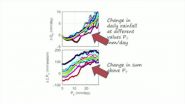INFORMATION:
For media enquiries contact Emily Head in the Cancer Research UK press office on 020 3469 6189 or, out of hours, on 07050 264 059.
Notes to editor:
Halsall et al. Cells adapt to the epigenomic disruption caused by histone deacetylase inhibitors through a coordinated, chromatin mediated transcriptional response. Epigenetics and Chromatin. DOI: 10.1186/s13072-015-0021-9
About Cancer Research UK
Cancer Research UK is the world's leading cancer charity dedicated to saving lives through research.
Cancer Research UK's pioneering work into the prevention, diagnosis and treatment of cancer has helped save millions of lives.
Cancer Research UK receives no government funding for its life-saving research. Every step it makes towards beating cancer relies on every pound donated.
Cancer Research UK has been at the heart of the progress that has already seen survival rates in the UK double in the last forty years.
Today, 2 in 4 people survive cancer. Cancer Research UK's ambition is to accelerate progress so that 3 in 4 people will survive cancer within the next 20 years.
Cancer Research UK supports research into all aspects of cancer through the work of over 4,000 scientists, doctors and nurses.
Together with its partners and supporters, Cancer Research UK's vision is to bring forward the day when all cancers are cured.
For further information about Cancer Research UK's work or to find out how to support the charity, please call 0300 123 1022 or visit http://www.cancerresearchuk.org. Follow us on Twitter and Facebook.
Scientists discover how cells overpower cancer drug
2015-09-16
(Press-News.org) CANCER RESEARCH UK scientists have found how cells adapt to overcome cancer drugs designed to interfere with their genetic controls, according to a study* published today (Wednesday) in Epigenetics and Chromatin.
Normally molecular 'tags' are attached to DNA which send signals to the cell, telling it how to package its DNA and switch genes on or off.
Drugs called HDAC inhibitors cause a build-up of certain types of tags, leading to potentially damaging changes in gene activity that can kill cancer cells.
But while HDAC inhibitors can successfully treat certain types of cancer, such as lymphoma, other types survive this disruption.
Scientists from the University of Birmingham, suggest that they do this by activating an in-built 'survival' response to HDAC inhibitors which rebalances the tags, maintaining normal gene activity and keeping the cells alive.
These findings could help identify which patients are suitable for treatment with these drugs. And could help develop future therapies that override the survival mechanism in tumour types that don't respond.
Lead author Dr John Halsall, Cancer Research UK scientist from the University of Birmingham, said: "Our work has shown that some cancer cells can survive the gene damage caused by HDAC inhibitor drugs, so we've unveiled a new layer of the cancer cell's defence that we need to target to destroy tumours.
"If we work out exactly which types of cancer are vulnerable to these drugs we can use them in a smarter way to treat patients more effectively."
Dr Kat Arney, Cancer Research UK's science information manager, said: "Working out how genes are switched on and off in cancer is vital if we're to truly understand and beat the disease. This study could help us tailor how we use HDAC inhibitors so that more patients could benefit from them, and we'll continue to work towards finding more effective ways to target cancer's control mechanisms in the future."
ELSE PRESS RELEASES FROM THIS DATE:
Nearby red dwarves could reveal planet secrets: ANU media release
2015-09-16
An accidental find of a collection of young red dwarf stars close to our solar system could give us a rare glimpse of slow-motion planet formation.
Astronomers from The Australian National University (ANU) and UNSW Canberra found large discs of dust around two of the stars, tell-tale signs of planets in the process of forming.
"We think the Earth and all the other planets formed from discs like these so it is fascinating to see a potential new solar system evolving," said the lead researcher Dr Simon Murphy, from the ANU Research School of Astronomy and Astrophysics.
"However, ...
The saying 'It never rains but it pours' is truer than ever in Scotland
2015-09-16
New research at the University of Warwick with colleagues from the London School of Economics has identified changes in the shape of rainfall across Europe; changes in the amount of drizzle compared with downpours and everything in-between.
Professor Sandra Chapman of the University of Warwick and co-authors Professor Nicholas Watkins and Dr David Stainforth from the London School of Economics have today published new research demonstrating how the variability in the way it rains makes it intrinsically difficult to identify the character of local climate change. Difficult ...
Arctic mosquitoes thriving under climate change, Dartmouth study finds
2015-09-16
HANOVER, N.H. - Warming temperatures are causing Arctic mosquitoes to grow faster and emerge earlier, significantly boosting their population and threatening the caribou they feast on, a Dartmouth College study finds.
The study predicts the mosquitoes' probability of surviving and emerging as adults will increase by more than 50 percent if Arctic temperatures rise 2 °C. The findings are important because changes in the timing and intensity of their emergence affect their role as swarming pests of people and wildlife, as pollinators of tundra plants and as food for ...
Banning trans fats in England could prevent 7,000 heart deaths over next 5 years
2015-09-16
A total ban on trans fatty acids (trans fats) in processed foods in England could potentially prevent or postpone about 7,200 deaths from coronary heart disease over the next five years, suggest experts in The BMJ this week.
They say a total ban in England is "technically feasible" and they call for "decisive action" to prioritise the most effective and cost effective policy options.
Industrial trans fatty acids are produced from plant oils (a process known as hydrogenation) and are commonly added to processed foods to cheaply improve shelf life and palatability.
Higher ...
Experts question the evidence underpinning e-cigarette recommendations
2015-09-16
Public Health England (PHE) recently endorsed the use of electronic cigarettes as an aid to quitting smoking. But in The BMJ this week, experts question the evidence on safety and effectiveness underpinning the recommendations.
Professor Martin McKee at the London School of Hygiene & Tropical Medicine and Professor Simon Capewell at the University of Liverpool, argue that the available evidence about e-cigarettes "suggests that the debate is far from over and questions remain about their benefits and harms."
The PHE report concludes that e-cigarettes are much safer ...
The reason why middle class people are more likely to play music, paint and act revealed
2015-09-16
The reason why middle class people are more likely to play music, paint and act has been revealed in a major new study.
Research involving 78,000 people found that it was not wealth or social status that were strongly linked to people taking part in arts activities as amateurs or professionals.
Instead, it was the level of education that lay behind arts participation, the study by Dr Aaron Reeves, a sociologist at the University of Oxford, found.
In an article in the journal Sociology, Dr Reeves said that of the 78,011 surveyed, 18% had taken part in painting or ...
Study from England shows no garden access for young children linked to childhood obesity later in childhood
2015-09-16
A study of 6467 children from England--presented at this year's annual meeting of the European Association for the Study of Diabetes (EASD) in Stockholm--shows that no access to a garden at age 3-5 years is linked to an increased risk developing obesity by age 7 years. The research is by Annemarie Schalkwijk, VU University Medical Centre, Amsterdam, the Netherlands, and colleagues.
Overweight and obese children are at increased risk of becoming overweight and obese adults and therefore being overweight or obese in childhood is an important risk factor for developing ...
Analysis of 21 studies shows exposure to pesticides is associated with increased risk of developing diabetes
2015-09-16
A meta-analysis of 21 studies presented at this year's annual meeting the European Association for the Study of Diabetes (EASD) shows that exposure to pesticides is associated with increased risk of developing diabetes by 61%, with different types of pesticides showing varying levels of risk. The study is by Giorgos Ntritsos, University of Ioannina, Greece, and Dr Ioanna Tzoulaki and Dr Evangelos Evangelou, Imperial College London, UK, and colleagues.
How diabetes develops is considered to be an interplay between genetic and environmental factors. Emerging evidence suggests ...
Women exposed to organic pollutants in early pregnancy have more than 4-times increased risk of gestational diabetes
2015-09-16
New research presented at this year's annual meeting of the European Association for the Study of Diabetes in Stockholm shows that a 10-times increased exposure to organic pollutants in early pregnancy is associated with a 4.4 times increased risk of a pregnant woman developing gestational diabetes. The research is by Assistant Professor Leda Chatzi, University of Crete, Heraklion, Greece.
Persistent Organic Pollutants (POPs) are a group of diverse substances, including polychlorinated biphenyls (PCBs) and organochlorine pesticides that are resistant to biodegradation ...
ESA/NASA Solar Observatory discovers its 3,000th comet
2015-09-15
On Sept. 13, 2015, the Solar and Heliospheric Observatory -- a joint project of the European Space Agency and NASA -- discovered its 3,000th comet, cementing its standing as the greatest comet finder of all time. Prior to the 1995 launch of the observatory, commonly known as SOHO, only a dozen or so comets had ever even been discovered from space, while some 900 had been discovered from the ground.
The 3,000th comet was originally spotted in the data by Worachate Boonplod, of Samut Songkhram, Thailand.
"I am very happy to be part of a great milestone for SOHO's comet ...



